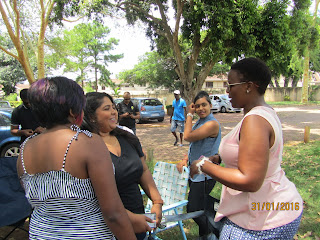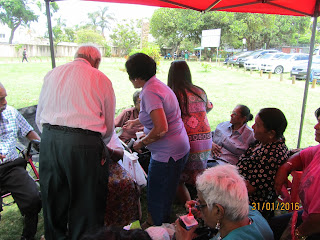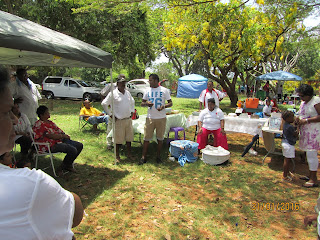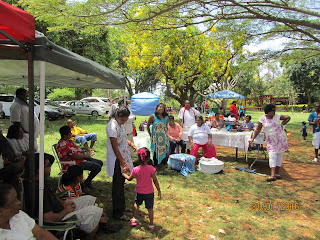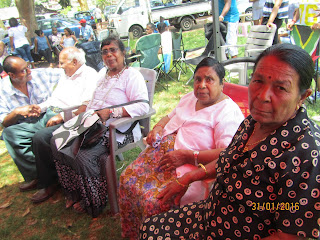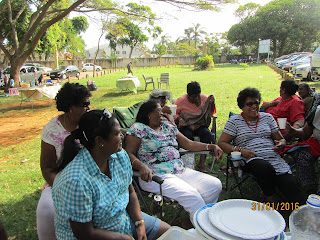“I have cherished the ideal of a democratic and free
society in which all persons live together in harmony and with equal
opportunities. It is an ideal for which I hope to live for and to achieve. But
if needs be, it is an ideal for which I am prepared to die.” – NELSON MANDELA
April 27 2021
As we celebrate 27 years of our new democracy on
Tuesday, April 27 (2021), I would like to bring you some of the words of wisdom
that our first democratic President, Nelson Mandela, had stated about freedom for all people.
Over the years ever since his release on February 11
1990 and his passing in December 2013, Dr Mandela always acknowledged the role
played by all South Africans in the struggles for a new, non-racial and
democratic South Africa and how the new South Africa would be a home for all citizens
and people.
I produced this radio documentary on his 90th
birthday on July 18 2008.
NELSON MANDELA – HIS RICH LEGACY OF A UNITED,
PEACEFUL, NON-RACIAL AND DEMOCRATIC SOUTH AFRICA
“I have cherished the ideal of a democratic and free
society in which all persons live together in harmony and with equal
opportunities. It is an ideal for which I hope to live for and to achieve. But
if needs be, it is an ideal for which I am prepared to die.”
The late former South African President, Nelson
Mandela, was more than just a political leader. At a time when South Africans
are celebrating 27 years of our freedom, it is appropriate to assert that Mandela
was one leader, like many of his contemporaries, who had continually promoted
unity, non-racialism and peaceful co-existence of all people.
Veteran journalist, Subry Govender, who has covered
Nelson Mandela ever since his release on February 11 1990 and right up to his
death on December 5 2013, writes that wherever
he is now, Mandela will be deeply disillusioned and disappointed by actions of
those political leaders who are now spreading racial hatred and disunity. It
seems that these new political elites have no respect or regard for Mandela’s RICH
LEGACY of unity, peaceful co-existence, non-racialism and democracy.
RICH LEGACY OF NON-RACIALISM, UNITY, PEACEFUL
CO-EXISTENCE AND DEMOCRACY
Although Nelson Mandela was imprisoned for nearly
three decades and spent more than 50 years of his life fighting minority rule,
he has always promoted the values and principles of unity and peaceful
co-existence of the majority African people alongside the white, coloured and
Indian-origin communities.
He first demonstrated his desire for a peaceful and
united South Africa only a few hours after his release from prison on February
11 1990. Addressing a massive crowd of people at the Grand Parade in Cape Town,
he said:
“I have cherished the ideal of a democratic and free
society in which all persons live together in harmony and with equal
opportunities. It is an ideal for which I hope to live for and to achieve. But
if needs be, it is an ideal for which I am prepared to die.”
F W de KLERK: “Man of integrity”
At the same time, he went further to demonstrate his
commitment to a peaceful South Africa when in his speech he showed no animosity
to his former oppressors and spoke highly of the last white President, F W de
Klerk.
De Klerk, not only made Mandela’s release possible,
but was also chiefly responsible for the peaceful transfer of power from the
white minority to the black majority, led by Mandela’s African National
Congress.
He referred to De Klerk as a “man of integrity”
despite drawing some “no, no” from the people who had gathered to welcome him
as a free man.
This is what he said about De Klerk:
“Mr De Klerk has gone further than any other
Nationalist President in taking real steps to normalise the situation.
“It must be added that Mr De Klerk himself is a man
of integrity.”
Mandela pursued the unity theme throughout the
negotiations process from 1990 and thereafter as President, and during his
retirement.
Only five days before he was installed as the
country’s first democratic President on May 10 1994, Mandela outlined his
vision for the new South Africa when he addressed a large crowd of people in
Cape Town. This public meeting was organised with the support of Archbishop
Desmond Tutu and struggle stalwarts such as Dr Alan Boesak, Trevor Manuel and
Mr Dullah Omar.
He once again spoke of the new non-racial South
Africa being a country where all people would live in peace and harmony.
“CITIZENS OF ONE NATION”
“The South Africa we have struggled for, in which all
our people, be they African, coloured, Indian or white, regard themselves as
citizens of one nation is at hand. We honour the best sons and daughters of all
our people. We can count amongst them, Africans, coloureds, whites, Indians,
Muslims, Christians, Hindus, Jews – all of them united by a common vision of a
better life for the people of this country.”
He showed this theme when he established his first
democratic government. It was not only all inclusive but he also ensured that
the different communities were represented in his Cabinet. He also travelled
the length and breadth of South Africa in order re-assure the different
cultural and religious groups that individual and group rights would be protected
in the new, non-racial and democratic South Africa.
“NO CULTURAL GROUP OR INDIVIDUAL SHOULD FEEL INSECURE
IN THE NEW SOUTH AFRICA”
In one address in Durban in November 1994, Mandela
gave an assurance that no cultural group or individual should feel insecure and
that they should become part of the new South Africa. This is what he said:
“The benefits of the new era for peace and prosperity,
freedom and tolerance will now be clear. We are one nation of many cultures and
religions. No community or religion has anything to fear from non-racialism and
democracy. On the contrary, all communities and religions now enjoy equal
respect without preference.”
In one address in Soweto in Johannesburg during the
same period, Mandela told the people that the ANC did not regard itself as
conquerors. This was his theme throughout his five-year term as President and
when he stepped down in 1999 it was the same message that he passed down to his
successor, President Thabo Mbeki, and other leaders within the ruling ANC.
And in 2008 when South Africans observed the 32nd
anniversary of the Soweto uprisings, Mandela used the occasion to once again
remind the youth that they must work towards promoting unity and non-racialism.
This was his message: “As future leaders of this country
your challenge is to foster a nation in which all people, irrespective of race,
colour, sex, religion or creed, can assert social cohesion fully. Mindful of
your own challenge you must continue to promote the principle of relentless
freedom and democracy as it is the foundation upon which issues of human rights
are ingrained.”
Now as South Africans celebrate 27 years of our new
democracy, many people are justly concerned that Mandela’s sacrifices for our
freedom may have been in vain. This is due to the unchecked way in which some
political leaders are poisoning the minds of young people and others through
their racially-inciting demagoguery.
It seems that these new political elites have no
respect or regard for the values and principles of a united, free, peaceful and
democratic society that Mandela had pursued during his life.
Mandela would definitely be feeling disillusioned and
disappointed wherever he is now. Ends – subrygovender@gmail.com April 27 2021



















